BMW > 1 Series (F20) > A) ENGINE PERFORMANCE (See also forced induction & remapping sections) > - Intake / Induction Systems, Carbon Airboxes, Throttle Bodies Etc > EVOLVE / EVENTURI
EVENTURI CARBON FIBRE INTAKE SYSTEM - BMW B58 M140I/M240I/340I
£1,172.00 inc. VAT
Product Code: eveb58crbfbint
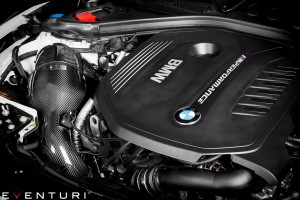
Click to Enlarge

Click to Enlarge
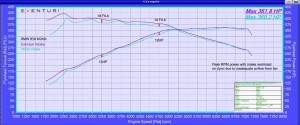
Performance Increase
Click to Enlarge
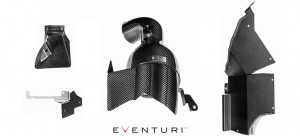
Click to Enlarge
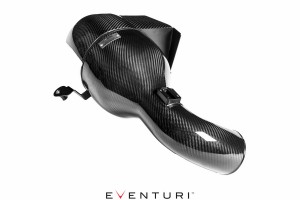
Carbon Intake
Click to Enlarge
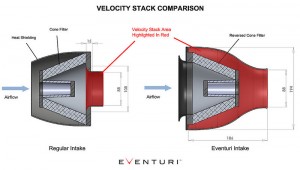
Click to Enlarge
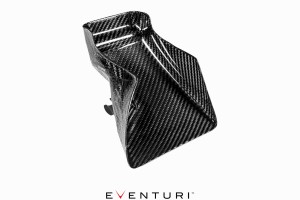
Carbon Scoop
Click to Enlarge
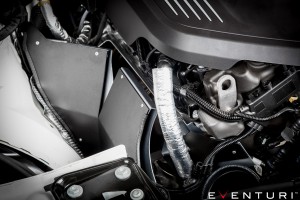
Main Heat Shield
Click to Enlarge
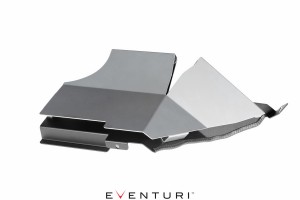
Main Heat Shield
Click to Enlarge
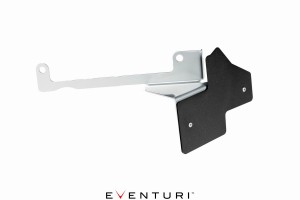
Secondary Heat Shield
Click to Enlarge
Description
The B58 Eventuri intake system is another example of our “Complete System” principal. It demonstrates the perfect balance between allowing for unrestricted airflow with our open filter housing whilst maintaining low IAT by cold air saturation with our scoop and shield combination. Every detail has been meticulously developed from the prepreg carbon pieces to the double layer heat shields. This intake sets a new benchmark in design and craftsmanship for the B58 platform.
Performance Increase: 12-15hp, 14-18ft-lb
Above is a dyno graph showing the comparison between the Eventuri and the stock airbox on a standard B58 M240i. As you can see, power and torque are increased through a large portion of the rpm range. This translates on the road to increased part throttle and full throttle response with the car pulling much more eagerly to the redline. At peak RPM the power curve for the intake merges with the stock airbox - this is due to the fact that on the dyno, the intake relies on the fan to push air through the scoop and into the filter. At high RPM the fan is simply inadequate in providing the required airflow - on the road this would not be a problem and we would expect the intake to continue making power gains up to the redline. The testing was done on the same day back-to-back and temperatures were monitored to ensure consistency.
Components
- Prepreg Carbon Filter Housing and integrated MAF tube
- High Flow Double Cone Urethane Filter
- Aluminium Entry Cowl
- Prepreg Carbon Scoop
- Prepreg Carbon Filter Shroud
- CNC machined MAF boss
- Double layer main heat shield
- Double layer secondary heat shield
- Laser Cut mounting brackets
Carbon Intake Housing Assembly
The filter housing comprises of a high flow filter, aluminium cowl, laser cut bracket, carbon heat shroud and the carbon pod itself, which extends to incorporate the MAF sensor and turbo tube. The carbon pod shrouds the reverse mounted filter and smoothly shapes the airflow down to the integrated MAF intake tube. This smooth reduction in cross sectional area invokes the Eventuri effect where the airflow accelerates whilst maintaining laminar conditions. It can be thought of as a large velocity stack - below is a diagram to show the comparison between our patent pending design and a regular intake system. The carbon filter housing and the inlet tube have been integrated to be 1 continuous piece. This reduces the number of internal interfaces and allows for smoother airflow to the turbo. The diameter of the tube smoothly transitions from the required diameter at the MAF sensor end to the larger diameter of the turbo inlet.
Carbon Heat Shroud
The Carbon filter housing is mated to a carbon heat shroud and an additional aluminium shield which stops the convective heat from the exhaust manifold saturating the filter. This coupled with our comprehensive double layered heat shields combine to provide a very effective cold area around the filter opening.
Carbon Scoop
The scoop was designed for maximum efficiency in directing the incoming air to the stock duct openings. Many aftermarket scoops have a large flat area almost perpendicular to the oncoming air - not great for channeling it into the ducts as the airflow just "hits" this flat portion and creates turbulence.
The Eventuri Scoops have been designed to sit directly behind the front grills to capture as much air as possible and with a continuous curve to the duct opening to ensure this airflow is efficiently channelled. The following video explains the design features behind our M2 scoop which directly apply to the B58 scoop. Having an effective cold air feed to the filter is an essential part of our design. Simply having some heat shields alone would result in elevated inlet air temperatures as the engine bay soaks with heat - especially on this engine since the manifold is directly next to the intake.
Scoop details for the M2 scoop which directly apply to the B58 scoop.
WE WILL BEAT ANY OTHER GENUINE QUOTE
Main Heat Sheild
A lot of attention was placed on the heat shielding since the intake is located next to the exhaust manifold. For this we used a double layer main shield with a silver finish on the exhaust side and black on the intake side. The silver layer reflects radiant heat from the exhaust and the black layer absorbs and radiant heat on the inlet side. The air gap between the two layers acts as an insulator to stop the conductive heat spreading to the inner layer. The secondary shield can also be seen in the above photo behind the turbo inlet pipe. During testing we found a temperature drop of over 90 degrees C across the shield which can be clearly seen in the thermal imaging video below. The effectiveness of the shield results in low inlet air temperatures whilst on the move.
Thermal Imaging
Secondary Heat Shield
The final shield mounts above the exhaust manifold and wraps around to protect the turbo inlet from direct heat saturation. Similar to the main shield - this is another double layer configuration with a silver layer on the exhaust side and a black layer on the inlet tube side.
Estimated Volumetric Shipping Weight : 10.00 Kg
Performance Increase: 12-15hp, 14-18ft-lb
Above is a dyno graph showing the comparison between the Eventuri and the stock airbox on a standard B58 M240i. As you can see, power and torque are increased through a large portion of the rpm range. This translates on the road to increased part throttle and full throttle response with the car pulling much more eagerly to the redline. At peak RPM the power curve for the intake merges with the stock airbox - this is due to the fact that on the dyno, the intake relies on the fan to push air through the scoop and into the filter. At high RPM the fan is simply inadequate in providing the required airflow - on the road this would not be a problem and we would expect the intake to continue making power gains up to the redline. The testing was done on the same day back-to-back and temperatures were monitored to ensure consistency.
Components
- Prepreg Carbon Filter Housing and integrated MAF tube
- High Flow Double Cone Urethane Filter
- Aluminium Entry Cowl
- Prepreg Carbon Scoop
- Prepreg Carbon Filter Shroud
- CNC machined MAF boss
- Double layer main heat shield
- Double layer secondary heat shield
- Laser Cut mounting brackets
Carbon Intake Housing Assembly
The filter housing comprises of a high flow filter, aluminium cowl, laser cut bracket, carbon heat shroud and the carbon pod itself, which extends to incorporate the MAF sensor and turbo tube. The carbon pod shrouds the reverse mounted filter and smoothly shapes the airflow down to the integrated MAF intake tube. This smooth reduction in cross sectional area invokes the Eventuri effect where the airflow accelerates whilst maintaining laminar conditions. It can be thought of as a large velocity stack - below is a diagram to show the comparison between our patent pending design and a regular intake system. The carbon filter housing and the inlet tube have been integrated to be 1 continuous piece. This reduces the number of internal interfaces and allows for smoother airflow to the turbo. The diameter of the tube smoothly transitions from the required diameter at the MAF sensor end to the larger diameter of the turbo inlet.
Carbon Heat Shroud
The Carbon filter housing is mated to a carbon heat shroud and an additional aluminium shield which stops the convective heat from the exhaust manifold saturating the filter. This coupled with our comprehensive double layered heat shields combine to provide a very effective cold area around the filter opening.
Carbon Scoop
The scoop was designed for maximum efficiency in directing the incoming air to the stock duct openings. Many aftermarket scoops have a large flat area almost perpendicular to the oncoming air - not great for channeling it into the ducts as the airflow just "hits" this flat portion and creates turbulence.
The Eventuri Scoops have been designed to sit directly behind the front grills to capture as much air as possible and with a continuous curve to the duct opening to ensure this airflow is efficiently channelled. The following video explains the design features behind our M2 scoop which directly apply to the B58 scoop. Having an effective cold air feed to the filter is an essential part of our design. Simply having some heat shields alone would result in elevated inlet air temperatures as the engine bay soaks with heat - especially on this engine since the manifold is directly next to the intake.
Scoop details for the M2 scoop which directly apply to the B58 scoop.
WE WILL BEAT ANY OTHER GENUINE QUOTE
Main Heat Sheild
A lot of attention was placed on the heat shielding since the intake is located next to the exhaust manifold. For this we used a double layer main shield with a silver finish on the exhaust side and black on the intake side. The silver layer reflects radiant heat from the exhaust and the black layer absorbs and radiant heat on the inlet side. The air gap between the two layers acts as an insulator to stop the conductive heat spreading to the inner layer. The secondary shield can also be seen in the above photo behind the turbo inlet pipe. During testing we found a temperature drop of over 90 degrees C across the shield which can be clearly seen in the thermal imaging video below. The effectiveness of the shield results in low inlet air temperatures whilst on the move.
Thermal Imaging
Secondary Heat Shield
The final shield mounts above the exhaust manifold and wraps around to protect the turbo inlet from direct heat saturation. Similar to the main shield - this is another double layer configuration with a silver layer on the exhaust side and a black layer on the inlet tube side.
Estimated Volumetric Shipping Weight : 10.00 Kg

